What is a Parable?
Parables are stories that use typical, everyday situations in order to teach important truths. Jesus used many parables to teach his followers about the KINGDOM OF GOD.
When people talk about the ministry of Jesus, it’s easy to focus on his miracles. Jesus performed some amazing feats that the world had never seen (and hasn’t seen since). But one of the most exciting things about His ministry was His teaching style.
Jesus taught using parables—simple stories intended to impart a spiritual lesson. He’s so identified with this teaching style that Mark’s Gospel tells us that “He did not say anything to them without using a parable”. We’ve collected all of Jesus’s parables from the synoptic Gospels: Matthew, Mark, and Luke. With each parable, you’ll discover:
Where it is located in Scripture
Who was present for this teaching
Why it was given
What is the key verse
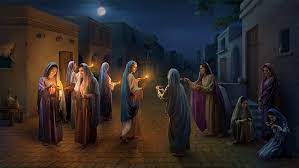
THE PARABLE OF THE TEN YOUNG WOMEN (VIRGINS)
Matthew 25:1-13
The practical lesson of this parable, therefore, is the unexpected nature of the Lord’s Coming. We must be ever ready to meet the Lord. The parable of the Ten Virgins reinforces the call for readiness in the face of the uncertain time of this second “coming. Keeping your lamps lit means having your mind alert and tuned into Jesus, ready to hear him. Keeping them full of oil means preparing in advance, by storing in your mind knowledge of Scripture and similar things.
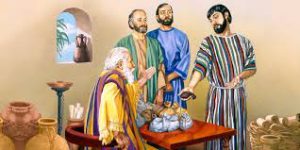
THE PARABLE OF THREE SERVANTS AND THEIR COINS
Matthew 25:14-30, Luke 19:11-27
As servants of Christ, we are called to be productive. All of our health, money, time, and abilities have come from Him, and we are tasked with putting them to use to benefit the kingdom. A time is coming when the Master will return to settle accounts, and then it will be too late.
It’s not enough to say, “I didn’t waste what you gave me, Lord.” We want to demonstrate how we have used the gifts and abilities we have been given to benefit the kingdom. God desires that we be risk-takers who share His commitment. That’s how we’ll enter into the happiness of the Master.
The master rewards his servants according to how each has handled his stewardship. He judges two servants as having been “faithful” and gives them a positive reward. To the single “unfaithful” servant, who played it safe, a negative compensation is given.
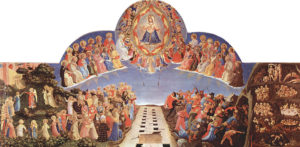
THE PARABLE OF SHEEP AND THE GOATS
Matthew 25:31-46
Jesus uses the example of a shepherd(JESUS) who separates his sheep(True Followers) from his goats in order to help his followers understand what judgment will be like. The parable of the Sheep and Goats explains the idea of judgment. The sheep represent everybody who has helped those in need or given back to the world in some way. The goats represent those who have acted in an unkind or selfish way.

THE PARABLE OF GOOD SAMARITAN
Luke 10:25-37
The parable of the Good Samaritan is told by Jesus in the Gospel of Luke. It is about a traveler who is stripped of clothing, beaten, and left half dead alongside the road. Finally, a Samaritan happens upon the traveler. Although Samaritans and Jews despised each other, the Samaritan helps the injured man.
Kindness begets kindness, and there’s no better way to demonstrate goodness and decency than to lend a hand when someone needs it the most. And don’t forget: Your kids are always watching you. When they see you act as a good Samaritan, they’ll likely grow up to do it too.
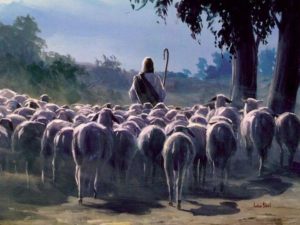
THE PARABLE OF THE SHEPARD
John 10:1-21
Jesus is the good shepherd and gives His life for the sheep. The false Christs don’t care about the sheep but run when they see the danger. They care not for the sheep. Jesus is the good shepherd and knows His sheep, who also know Him.
Jesus is saying that it is through him that we get to heaven (are saved). A gate provides a way through a barrier. If not for the gate, we could not get in, because there is no way to get over or around the wall. A gate controls who can come through and who may not.
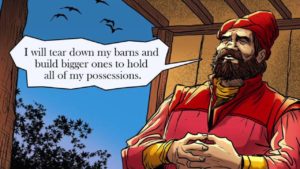
THE PARABLE OF THE RICH FOOL
Luke 12:16-21
The rich farmer in this parable is portrayed negatively, as an example of greed. By replacing his existing barn, he avoids using agricultural land for storage purposes, thus maximizing his income, as well as allowing him to wait for a price increase before selling. The farmer was “planning to fill his soul with excessive and unnecessary feasting and was proudly disregarding all those empty bellies of the poor. He did not realize that the bellies of the poor were much safer storerooms than his barns.”

THE PARABLE OF THE WATCHFUL SERVANTS
Luke 12:35-48
The servants are all given tasks to perform while their master is away. Jesus teaches that when the master returns, those who have been watching for their master’s return and have been doing what he told them to do will be blessed and given greater trust.
In Matthew, the parable opens with the injunction: “Therefore keep watch, because you do not know on what day your Lord will come”. In other words, “the disciple must remain prepared for his Lord’s coming, remaining alert and awake at his post.” Even though there may be general signs of Jesus’ Second Coming, the exact time is unknown. This is a theme that has also been discussed earlier in the reference to a wedding banquet in Luke suggests a heavenly banquet, and recalls the parable of the Ten Virgins, which follows this parable in Matthew.
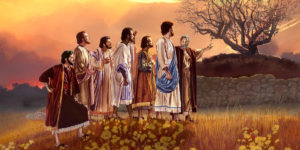
THE PARABLE OF THE BARREN FIG TREE
Luke 13:6-09
Fig tree naturally grows fruit before the leaves open, so this tree in full leaf gave promise of well-developed fruit within it. Upon searching its branches Jesus found “nothing but leaves.” It was a mass of pretentious foliage, nothing more. Jesus Christ warning Christians that they must bear fruits after their conversion worthy of repentance or risk being condemned to Hell. God, in His mercy, repeatedly checks on believers to see if they have borne fruit worthy of their baptism and conversion. If someone who has been baptized and says they are Christian has not borne fruit, they are condemned. This verse was used during the Counter-Reformation to help support the belief of the Church that faith without works is dead.
The fig tree was a common symbol for Israel and may also have that meaning here, and the tree in the parable may refer to a Christian who has heard the gospel of Christ by faith unto salvation. In either case, the parable reflects Jesus offering a chance for repentance and forgiveness of sin, showing his grace toward his believers. “These three years” logically refers to the period of Jesus’ ministry, or simply that is the period it took for a fig tree to bear fruit. The fig tree (gentiles) was given the opportunity to be in the vineyard where it otherwise should not have been as well as the needed time to bear fruit. The vinedresser, who is Jesus, does not fail and has offered to cultivate it and so it will produce fruit.

THE PARABLE OF THE LOST SHEEP
Matthew 18:12-14, Luke 15:3-07
The ninety-nine sheep in the story represent self-righteous people—the Pharisees. These people keep all the rules and laws but bring no joy to heaven. God cares about lost sinners who will admit they are lost and turn back to him. The Good Shepherd seeks after people who recognize they are lost and in need of a Savior.
Jesus tells the parable of the lost sheep to show that the Kingdom of God is accessible to all, even those who were sinners or strayed from God’s path. Jesus stresses that when the shepherd finds the lost sheep he rejoices over it more than the 99 who did not go astray.

THE PARABLE OF THE LOST COIN
Luke 15:8-10
This parable teaches us that God is a loving and forgiving person. Although someone may have been lost, they can still be found and repent and be let into the kingdom of heaven. God values those people far more than those who refuse to admit that they have sinned and claim to be followers of him.
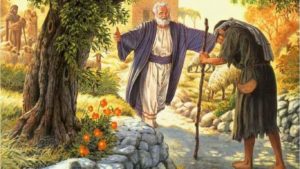
THE PARABLE OF THE LOST SON
Luke 15:11-32
Some of the themes of the Prodigal Son are greed, arrogance, jealousy, repentance, forgiveness and acceptance.
The parable of the lost son, captures the love of our heavenly Father, God, for sinners and His willingness to forgive and receive back repentant sinners. There are other lessons to learn from this young man, who is so popular that the phrase prodigal son is used even outside the Christian circles
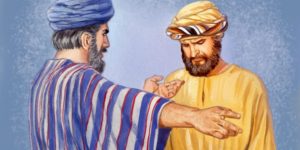
THE PARABLE OF THE SHREWD MANAGER
Luke 16:1-13
Let no one deceive himself. If anyone among you thinks that he is wise in this age, let him become a fool that he may become wise. The master commended the dishonest manager for his shrewdness. For the sons of this world are more shrewd in dealing with their own generation than the sons of light. And I tell you, make friends for yourselves by means of unrighteous wealth, so that when it fails they may receive you into the eternal dwellings.
When, therefore, anyone anticipating his end and his removal to the next world, lightens the burden of his sins by good deeds, either by canceling the obligations of debtors, or by supplying the poor with abundance, by giving what belongs to the Lord, he gains many friends, who will attest his goodness before the Judge, and secure him by their testimony a place of happiness.

THE RICH MAN AND LAZARUS
Luke 16:19-31
The Lazarus and Rich Man parable teaches us that spiritual blindness causes us to fumble about aimlessly, ignore those in need around us, and not see the beauty of this world that God shows us all the time. The Parable of Lazarus and Rich Man encourages us to do some self-examination.
Others believe that the main point of the parable was to warn the godless wealthy about their need for repentance in this life and Jesus did not intend to give a preview of life after death. The parable teaches in this particular case that both identity and memory remain after death for the soul of the one in hell.

THE PARABLE OF THE WIDOW AND THE JUDGE
Luke 18:1-08
The parable of the unjust judge is a parable told by Jesus about a judge who did not fear God, nor care for his fellow man. He is approached by a lady, who asks him to grant her justice. If they do this, then God will always grant them justice. This parable was also significant because it teaches us to never give up.
The parable demonstrates the need to always pray like that persistent widow, for if even an unjust judge will eventually listen, God is much quicker to do so. The parable of the Friend at Night has a similar meaning. The prayer of the lowly pierces the clouds; it does not rest till it reaches its goal, nor will it withdraw till the Highest responds, judges justly, and affirms the right.

THE PARABLE OF THE PHARISEE AND THE TAX COLLECTOR
Luke 18:9-14
The Pharisee prayed about how good he was, but the tax collector asked for God’s mercy as he was a sinner. Jesus said that it was the tax collector who went home justified before God. He concluded, “Everyone who exalts himself will be humbled, and he who humbles himself will be exalted.”
A Pharisee spirit is one who believes they somehow do Christian life better than others. They judge people for what they wear, what they drive, what church they go to, how often they pray, what version of the Bible they read.
